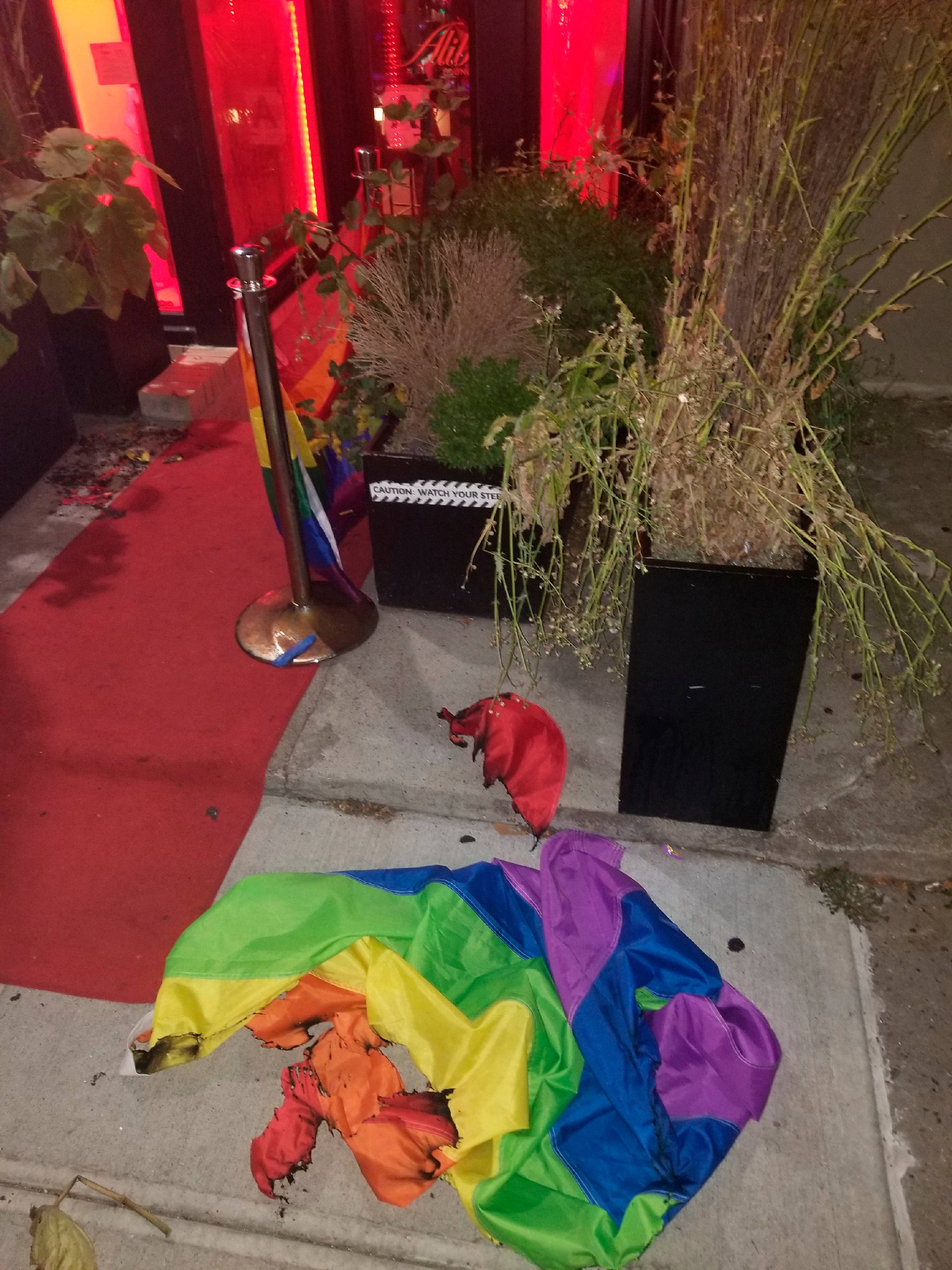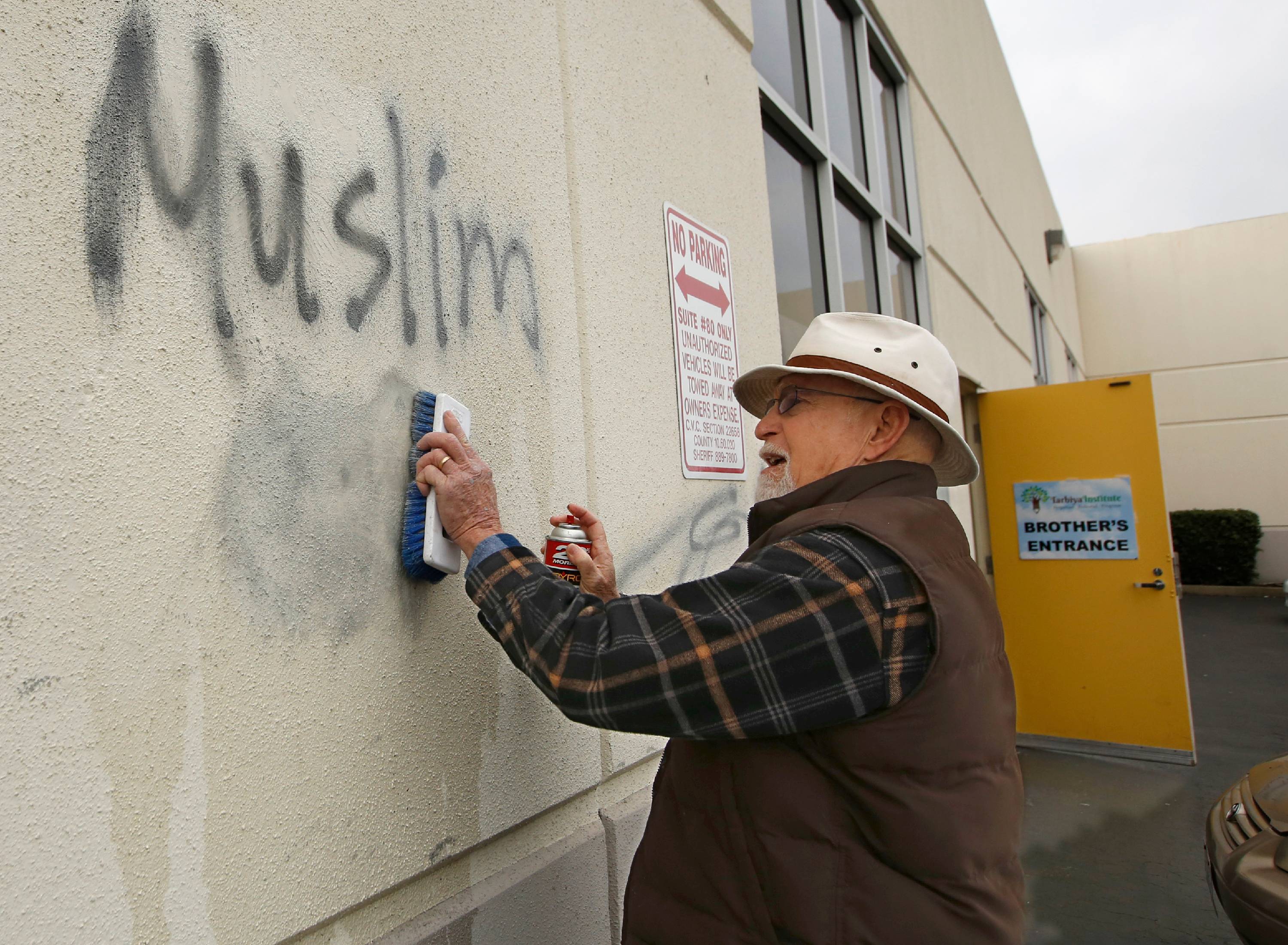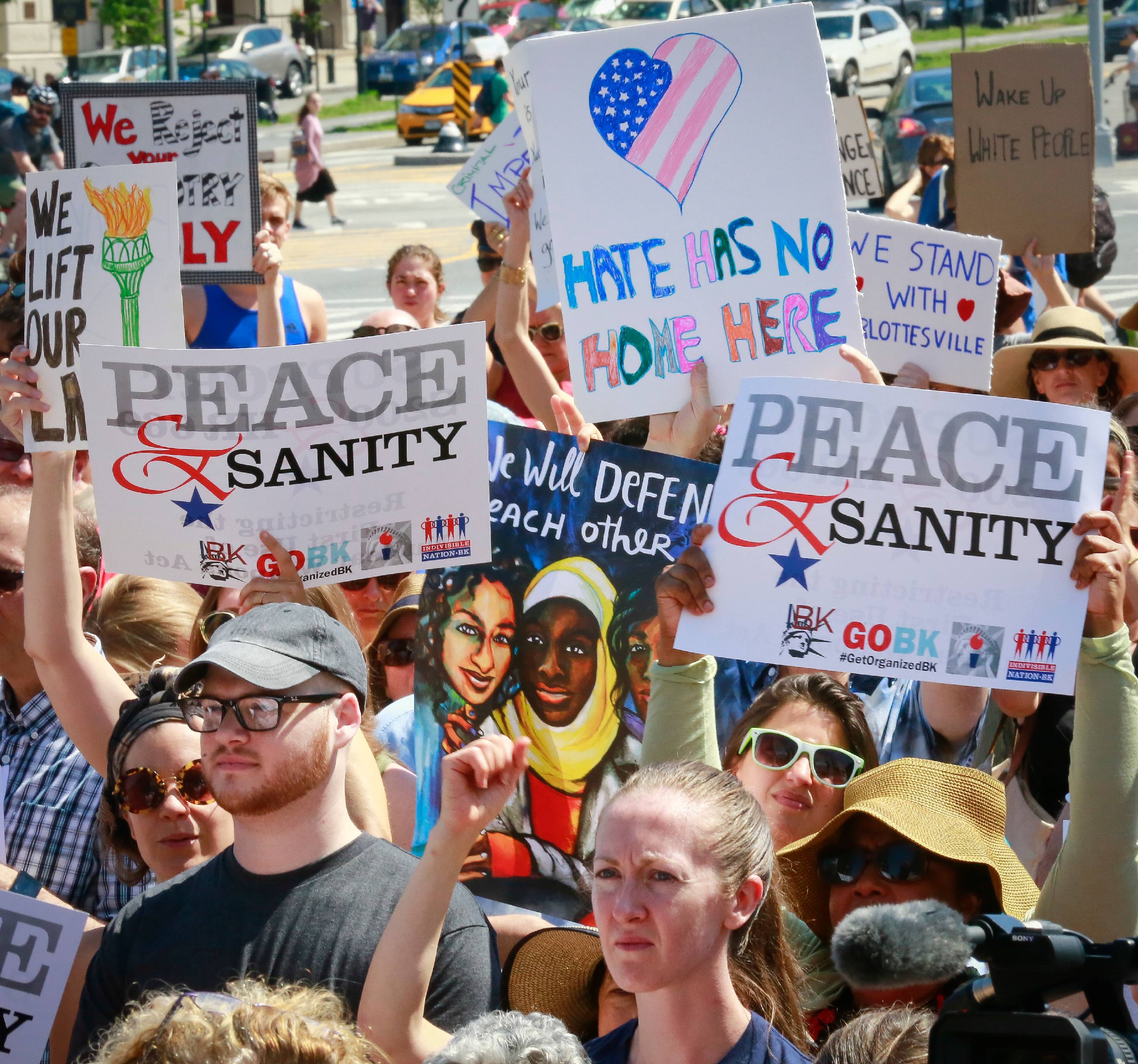A Disturbing Trend
Swastikas painted on buildings, a Mexican woman beaten and left for dead and verbal threats shouted by drivers on the road.
These are just some of the approximately 2,300 recently documented acts of hate hurled toward specific groups in the tri-state area.
Hate at Home: A Problem All Around Us
News 12 has compiled, researched and organized hate-crime data that shows disturbing incidents of hate at a time when the country seems more divided than ever. The incidents have left a deep impact on individuals and communities in New York, New Jersey and Connecticut.
 Statistics researched for this project show the Jewish community to be among the most common target of hate. However, the incidents overall impact a wide range of victims from a variety of backgrounds.
Statistics researched for this project show the Jewish community to be among the most common target of hate. However, the incidents overall impact a wide range of victims from a variety of backgrounds.

A burned rainbow flag lays on the stoop of the Alibi Lounge, early Monday, July 8, 2019, in New York City. (Alexi Minko via AP)
Never the SameFor many victims of hate, life is never the same.
The attacks may be different, but the wounds cut deep.
“There is something poisonous, dangerous, emerging and it needs to be stopped,” says Rabbi Aryeh Katzin.
Brooklyn has seen its fair share of hateful incidents, especially those against the Jewish community.
Recent acts of hate have included swastikas etched on properties, vile slurs and attacks on the street, and even a disturbing message at a children’s museum stating, “Hitler is coming.”
“What they have in common is that the crime impacts more than just the person who's been targeted. Hate crimes are particularly vile because they impact an entire community,” says Brooklyn District Attorney Eric Gonzalez.
Hate crimes are particularly vile because they impact an entire community.
A rise in hate citywide has many on edge. Both in Brooklyn and around the city, statistics show that the Jewish community is most often the target.
“I would never let my wife or my daughters or myself walk alone, I always have somebody walk with me,” says Rabbi Menachem Heller.
Video: Lasting Impacts
Data from the NYPD shows 151 anti-Semitic hate crimes were reported citywide in 2017. More than a third of those, 58 reports, came from Brooklyn. In 2018, 186 hate crimes were reported targeting the Jewish community, with 77 of those from Brooklyn. In just the first half of this year, the city has already seen 145 attacks against the Jewish community. More than half of those, 75 reports, were made in Brooklyn.
The second most targeted groups have been members of the LGBTQ+ community and the black community.
News 12 Brooklyn compiled
our own database of bias incidents reflecting all of the acts of hate we’ve reported on since 2017. Our numbers also reflect this increase. We reported on eight incidents targeting Jews in 2017, 10 in 2018 and already 14 reported incidents since the start of 2019.
"Most of the hate crimes we see in Brooklyn are property crimes. Someone is vandalizing, destroying, graffiti. We see more of those then we actually see physical assaults. They both have devastating impacts, but we can often fix and clean up the vandalism,” says DA Gonzalez.
When someone says to you ‘Hitler didn't finish the job,’ how does that affect you the rest of your life?
However, victims say even a non-violent act of hate leaves lasting wounds.
"When you have someone say to you, ‘you dirty-expletive-Jew,’ when someone says to you ‘Hitler didn't finish the job,’ how does that affect you the rest of your life? That becomes part of your psyche, that becomes part of your insides,” says former New York Assemblyman Dov Hikind.
Interview: Former New York Assemblyman Dov Hikind:
A majority of cases are reported in neighborhoods with large Jewish populations including Crown Heights, Williamsburg and Borough Park.
Brooklyn DA Gonzalez tells News 12 he believes many cases aren't even being reported.
"I have the only dedicated hate crimes bureau in the state and I encourage people to report so that we can investigate,” says DA Gonzalez.
Part of the challenge, he says, is that many of the recent offenders are teenagers. Cases like that are out of his jurisdiction.
"A number of them are being committed by young offenders. I mean young, very young offenders, 13, 14, 15. So those cases many people don't realize don't come to the DA’s office. They go to family court,” says Gonzalez.
Many hate crime reports don't see an arrest. When an arrest is made, proving that it's a hate crime is a challenge, according to Gonzalez.
“We have to prove not only the identity of the assailant and that they actually committed the crime accused of but that the crime was committed in substantial part or in whole part because of a racial animus or bias,” says Gonzalez.

Tom Garing cleans up racist graffiti painted on the side of a mosque in what officials called an apparent hate crime, in Roseville, Calif. (AP Photo/Rich Pedroncelli)
Impacts on the CommunityActs of hate aren’t new in New York City, but recently many say they've resurfaced with a vengeance.
Statistics from the NYPD show that most acts of hate in Brooklyn target the Jewish community.
Growing up, looking at my mother’s arm with her number from Auschwitz… People don’t know what Auschwitz is. I mean what more is there to say?
Since the start of 2017, News 12 Brooklyn’s database shows we’ve reported on at least 15 incidents of swastikas found scrawled on parks, drawn on walls, and etched on public property. One of the latest was found on a Bushwick mural in August.
Members of the Jewish community say all of these incidents are painful reminders that hate and racism are still prevalent in the city.
“Growing up, looking at my mother’s arm with her number from Auschwitz… People don’t know what Auschwitz is. I mean what more is there to say?” says former New York Assemblyman Dov Hikind.
For Bushwick Rabbi Menachem Heller and his family, hate came with more than a hateful inscription this winter. For them, it was a night of broken glass.
“It sounded like an explosion,” says Rabbi Heller.
Interview: Rabbi Menachem Heller - Victim of Vandalism
He says during Shabbat services in February, their holy family dinner was shattered along with the glass window in their synagogue.
“It was really frightening when it happened, we didn't know what it was. And I grab the kids and I ran behind the bookcase over here,” says Rabbi Heller.
Interview: New York City Councilman Chaim Deutsch:
It’s not just the Jewish community feeling hate at home. Islamophobic graffiti was spotted in Sheepshead Bay in June. A man was captured on camera during a racist rant late last year.
Devorah Halberstam co-founded the Jewish Children’s Museum in honor of her son, Ari Halberstam. He was killed in 1994 when a gunman opened fire on a van of Jewish students.
“This is the United States of America. He was murdered on the Brooklyn Bridge in broad daylight at 10:21 in the morning. You don't get over that,” says Halberstam.
Since then, the Jewish Children’s Museum, the very establishment which she says meant to serve as an antidote against hate, saw several displays of hatred.
“We have had a bomb threat a few years back, we also had some property damage on the wall on the mural which was key scratched, and lately we had a message that was posted on the wall of the museum saying that ‘Hitler is coming,’” says Halberstam.
In some cases, victims say, the hate gets physical, leaving both emotional and physical wounds.
Abraham Gopin was exercising in a park in Crown Heights when he says he was attacked by a man who tried to beat him with a brick. The suspect now faces hate crime charges.
Interview: Abraham Gopin - victim of a hate crime who was beaten with a brick:
"By the miracle of god, he wasn’t able to get me with the rocks,” says Gopin.
Gopin has not been the only victim of a violent attack on the streets of Brooklyn.
These hate crimes, what they really do share is that they terrorize communities, people are afraid to leave their homes
Menachem Moskowitz was attacked last year after saying hello to a man in Crown Heights. The man reportedly beat him and choked him.
“He started screaming ‘fake Jews stole my house, stole my property and my money, don’t say hello to me,’” says Moskowitz.
Brooklyn District Attorney Eric Gonzalez says is that hate crimes don’t impact just one victim. They leave a community of people scared of being who they are.
“These hate crimes, what they really do share is that they terrorize communities, people are afraid to leave their homes,” says Gonzalez.
Halberstam, whose son lost his life to hate 25 years ago, says she was sentenced to a lifetime of suffering.
“What I do every day is that I wake up with the prayer and the hope that I can prevent another Ari Halberstam. I can prevent another mother from going through what I've gone through, another community from looking over their shoulder,” says Halberstam.
Officials say they believe many hate crimes are not being reported. Some don’t say anything from fear and others don’t want to inspire copycats, according to officials. However, police are asking that victims come forward, so they can get the perpetrators off the streets. One way to report these crimes is to call the District Attorney’s Hate Crime Hotline at
(718) 250-4949. 
Protesters listen during a "Peace and Sanity" rally in Brooklyn. (AP Photo/Bebeto Matthews)
No Easy Answer
What’s driving the uptick in hate in Brooklyn? For many advocates and victims, there isn't one single answer.
“Some kids just do it for the fun of it without realizing the effects they have on the people around them,” says Devorah Halberstam, co-founder of the Jewish Children’s Museum.
Video: Difficult Problems, Difficult Answers
“Sometimes, when a person commits a hate crime, it’s because they don’t understand the impact of a hate crime,” says Brooklyn Councilman Chaim Deutsch.
Some cite a lack of education among our city’s young people, while others believe the hate is inspired by opposite ends of the political spectrum.
“We have a situation today where members of Congress indulge in anti-Semitism,” says former New York Assemblyman Dov Hikind.
Sometimes, when a person commits a hate crime, it’s because they don’t understand the impact of a hate crime.
Meanwhile, Brooklyn District Attorney Eric Gonzalez has a different view, saying he believes the flare up is inspired by rhetoric coming from the White House.
Others put the blame on prosecutors, who they say aren’t treating these crimes as seriously as they should.
Devorah Halberstam, co-founder of the Jewish Children’s Museum, says plea deals can be part of the problem.
Hate at Home: Investigation Overview
“If we are making plea deals on felony charges, we are doing a grave injustice to the public. Because unfortunately that is how you have the revolving door,” says Halberstam.
Activists say part of their concern is the possibility of a revolving door of repeat offenders harboring hatred. Brooklyn DA Gonzalez says plea deals are common in our judicial system, and repeat offenders are not what are driving these crimes.
If we are making plea deals on felony charges, we are doing a grave injustice to the public.
"I actually think plea deals are an important function in hate crimes because it often causes someone to have to admit guilt, or having someone actually acknowledge that they did wrong is important. And I do believe that a lot of the answers to these hate crimes are going to be restorative justice," says Gonzalez.
New York State penal code outlines a process for prosecuting hate crimes.
“It’s elevated one degree,” explains Gonzalez. “So a misdemeanor assault becomes a felony, a low-level felony assault. A criminal mischief, that would just be a misdemeanor, could be raised to a felony.”
Activists say education is an important part of preventing future acts of hate. That's why Democratic District Leader Geoffrey Davis, and his friend Rabbi Eli Cohen from the Crown Heights Jewish Community Council, took matters into their own hands.
I do believe that a lot of the answers to these hate crimes are going to be restorative justice.
“We went to the schools and called it the ‘Stop the Violence Listening Tour…’ We wanted to address the violence about the uptick and the hate crimes against my Jewish brothers and sisters. And then we’ve got to reach out to our children about things going on in their life,” says Davis.
Interview with Stephanie - Found swastika drawn on a mural
Activists say it's easy to be fearful in the wake of hate incidents but the fact that New Yorkers step up to the plate to tackle these issues make them feel optimistic.
Project Credits:
Christian Braxton: Photographer
Deena Farrell: Digital Producer
Syed Imam: Developer
Stan Kowalski: News Director, News 12 The Bronx
Hannah Kliger: Reporter/Editor/Photographer
Elly Morillo: News 12 Digital Producer
Laurent Octobre: Photographer
Pratik Parija: Graphics
Frank Pokorney: News 12 Digital Executive Producer
Aime Rodriguez: News 12 Brooklyn Bureau Chief
Tara Rosenblum: Investigative Reporter
Jose Sanchez: Photographer
Manoj Shamdasani: Vice President, Local News
Chris Vaccaro: Vice President, News 12 Digital



















